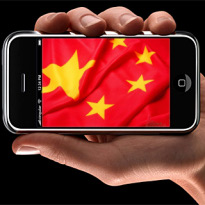 Researchers at Strategy Analytics claim China has overtaken the United States as the world’s largest smartphone market by shipments. The Asian tiger received 23.9m units in Q3 2011 (up 58% sequentially), compared to 23.3m shipped in the US (down 7%). However, with the western holiday season approaching, the US could regain the shipments lead as stockings are stuffed with shiny new gadgets. Strategy Analytics director Thomas Kang expects the lead to change hands over the next few quarters, but “going into next year, China will outstrip the US market continuously. China is going to be larger every quarter.”
Researchers at Strategy Analytics claim China has overtaken the United States as the world’s largest smartphone market by shipments. The Asian tiger received 23.9m units in Q3 2011 (up 58% sequentially), compared to 23.3m shipped in the US (down 7%). However, with the western holiday season approaching, the US could regain the shipments lead as stockings are stuffed with shiny new gadgets. Strategy Analytics director Thomas Kang expects the lead to change hands over the next few quarters, but “going into next year, China will outstrip the US market continuously. China is going to be larger every quarter.”
Strategy Analytics’ figures were challenged by two other research firms: Gartner claims US smartphone sales outpaced China’s by 500k units, while Canalys put the US shipments lead at 200k. Quibbling aside, even if the US is still ahead by a nose, the way all the figures are trending, the ultimate outcome of this contest is not in serious doubt.
For the moment, the US retains the lead in total revenue generated from smartphone sales, as western consumers tend to purchase pricier units like Apple’s iPhone, compared to the less expensive Nokia phones used by 28% of Chinese smartphone owners. (Mimicking its declining fortunes around the globe, Nokia used to hold a 70% market share in China.) Samsung holds the second biggest slice of China’s smartphone pie at 17.6%. Apple accounts for just 12% of the market (compared to 20.6% in the US), but is doubling its presence in China each year.
Kang suggests it may be three to four years before China assumes the revenue lead as well, but make no mistake, China will take the lead. Strategy Analytics’ Neil Mawston called China a market “that no hardware vendor, component maker or content developer can afford to ignore.” The same could be said for online gaming operators. If you don’t already have a strong Asian strategy in place, then we sincerely hope you have a merry little Christmas this year, because there may be a lot less cause for celebration in the years to come.